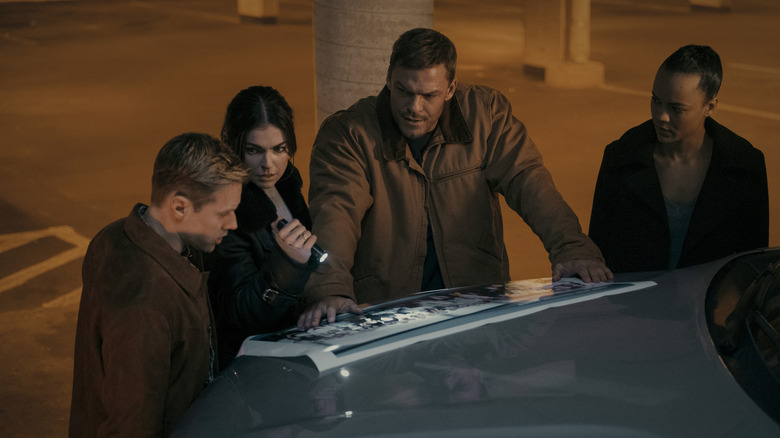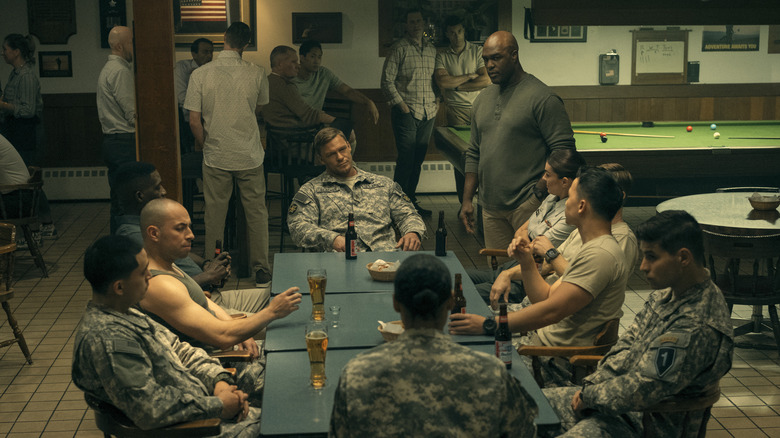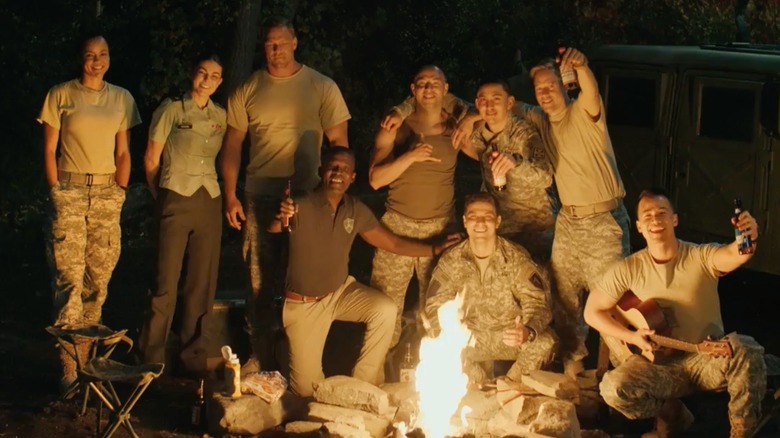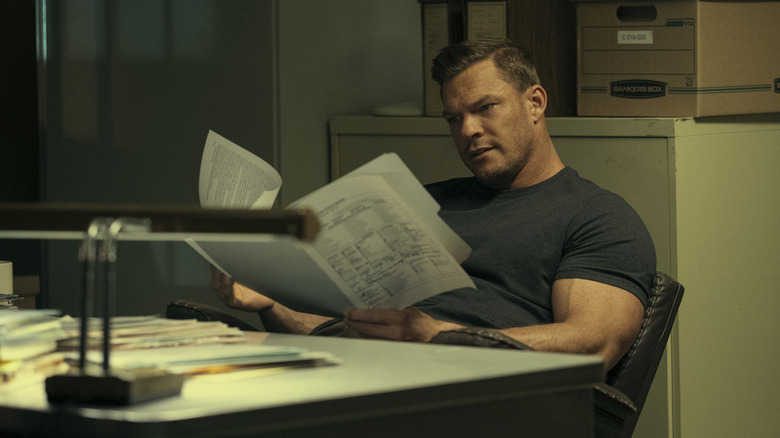Reacher Season 2 Introduces A New Team Of Army Badasses – But Are They Real?
Of all the shows airing these days, it doesn't seem fair to criticize "Reacher" for its lack of realism. Like the books before it, the Amazon TV series is a wish-fulfillment fantasy series for middle-aged dads (which is not to suggest other people don't love it too) and is not intended to hold up to a thorough fact-checking. Audiences love Jack Reacher because there's something inherently appealing about his lack of life commitments and his ability to beat up and outsmart any bad guy who crosses his path; it's not because they genuinely find it believable that Reacher would uncover a mass criminal conspiracy on an annual basis.
That said, author Lee Child still did his due diligence with Reacher's military background, and so did the writers for the "Reacher" TV series. The first three episodes of season 2 put a lot of focus on Reacher's time as the leader of a Special Investigations Unit back in his military days — and to a viewer without a military background, everything here probably seems reasonably realistic, if also clearly heightened for dramatic effect. But how does all this look to someone who does have a military background? For /Film, I talked to an Army intelligence member who's been in the military for almost two decades, and I came out of the conversation with a better understanding of just how much "Reacher" checks out.
The Special Investigations Unit is mostly real
The driving storyline of season 2 is Reacher being reunited with his old army buddies. More specifically, he's reuniting with the members of the 110th MP Special Investigations Unit, a division run by Reacher that investigated matters of corruption throughout the whole military. As Reacher himself put it, if potential corruption was reported "about any army base, anywhere in the world, no matter how minor the infraction, we're copied on it."
All of the Special Investigators we meet throughout the season, especially Officer Dixon (Serinda Swan) and Officer O'Donnell (Shaun Sipos), are described as the best of the best. It makes sense; one of the closest real-life equivalents to this unit is the Army's Field Investigative Unit, which originally began as a task force in 1984 before being "redesignated" as the FIU in 1996. "The special agents assigned to the FIU are of the highest caliber and have extensive investigative experience," the Army's website reads. "Nominees go through a board review that looks over their entire service record, as well as their overall suitability for the position."
We don't see any such board review in the show, but it's established early on that Reacher put a ton of thought into each member he picked. Reacher's explanation for picking Calvin Franz (Luke Bilyk) was because he saw him de-escalate a petty fight among his peers, but it's likely the decision to add him went far more in-depth than that. This added context also sheds more light on Reacher's relationship with Neagley (Maria Sten), who was the only member not promoted to the rank of Officer before joining the unit. Reacher must've really seen something special in her, considering her resume alone wouldn't typically be enough to grab his attention.
The brawl at the bar
As the second episode of the season reveals, however, hiring a lower-ranked member for the team might've been a part of Reacher's plan. The show gives us a flashback scene where the Special Investigations Unit, not yet a close-knit team, go out for drinks together at an Officer's Club. This turns out to be a problem, as one of the officers at the bar demands that Neagley (a lowly master sergeant) leave the building. Reacher refuses to make her leave, and a brawl breaks out in response. The SIU wins the fight off-screen; they've got a couple of bruises, but overall it seems like it was a positive experience for them. They've now bonded as a team and are ready to work together, just as Reacher planned.
As my army source made clear, this sequence of events is pretty nonsensical. If a fight like that did happen, everyone involved would be receiving some sort of administrative punishment. Odds are, at least a few of them would be demoted and Reacher would probably be pulled off the assignment. For such a high-stakes unit with such a high bar of entry, this sort of behavior would be a big deal and not shrugged off nearly as easily as the flashbacks imply it was.
There are some caveats to this, however. The first is that fraternization between people of different ranks in the military, and among officers and non-officers specifically, is indeed the complicated, touchy subject "Reacher" depicts it as. Mixing ranks in informal settings is often frowned upon; it raises too many questions about whether the senior officer is abusing their power or playing favorites with their subordinates. As for the other caveat...
Officer's clubs are not as popular these days
When I described the bar fight scene to my Army source, his takeaway was that the scene sounded like something that would be a lot more believable if it had taken place in the '80s or '90s, not in the post-9/11 military the TV show depicts. The military, he told me, became far less lenient with the sort of behavior Reacher exhibits in this flashback. He recalled hearing plenty of older stories of platoons fighting with other platoons without any major consequences, but it isn't something that happened in the stricter, more high-stakes culture of the 2000s and 2010s.
He also went into how the division between officers and enlisted isn't quite as severe as it used to be, as well as how officer's clubs just aren't as prevalent as they used to be, which is a claim definitely supported by most reporting on American military culture post-Cold War. A situation where an officer would care so much about Neagley's presence in their bar, and where it would be semi-normal for Reacher's unit to be drinking in the bar in the first place, would feel a lot more likely in a flashback that was supposed to take place in the early '90s, not in the 2000s.
In that sense, the inaccuracy of the show's scene is pretty forgivable given the source material. Book Jack Reacher started up the Special Investigations Unit in 1993, where a scene like this would've been a bit more believable. The situation still probably wouldn't be quite as dramatic, but that's television for you.
Reacher's hobo lifestyle is even weirder than it looks
The final question regards the SIU members themselves: exactly how realistic are the show's version of Neagley, Dixon, and O'Donnell? It turns out, they're far more believable than Jack Reacher himself. Someone who made it to Reacher's rank would be older than the Reacher we've got, and he'd likely have a much more impressive career planned out for when he eventually did leave the military. While homeless veterans are unfortunately not that rare in real life, Reacher's brand of homeless drifter certainly is.
Of course, this aspect isn't really a lack of realism so much as it's a central theme of the show, and of this season in particular. Dixon, O'Donnell, Neagley, and all the other old Special Investigators have gone down the traditional, realistic route of using their massive military accomplishments to pursue lucrative, prestigious careers. Reacher's self-described hobo lifestyle is explicitly considered to be unusual by the rest of them, and that's something Reacher will have to think about a lot this season. Will he be swayed by the stability and comfort of his friends' normal lives, or will he end the season still committed to wandering the countryside with no home, family, or possessions? He's still Jack Reacher, so he'll almost certainly keep doing the latter, but maybe this season he'll have to reflect on the choice a little more than usual.
"Reacher" is streaming on Prime Video.




